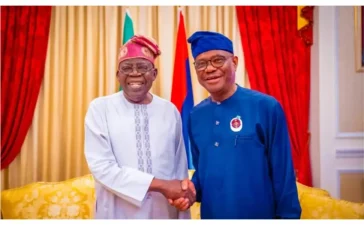An Economist, Mr. Marcel Okeke has raised concerns about the potential for corruption to undermine the effectiveness of President Bola Ahmed Tinubu’s newly announced palliatives. Okeke emphasized the need for rigorous monitoring and proper implementation to ensure that the intended benefits of these measures are not siphoned off through political patronage along party lines.
Speaking at the monthly forum of the Finance Correspondents Association of Nigeria (FICAN) in Lagos, Okeke applauded the Federal Government’s establishment of the Taiwo Oyedele led Committee on fiscal policy and tax reforms. He expressed optimism that the committee’s efforts would introduce innovative revenue-generation ideas for Nigeria and work towards streamlining tax policies for both companies and individuals, thereby providing relief.
Addressing the announced ₦500 billion palliative package aimed at mitigating the impact of recent policy reforms on vulnerable households and businesses, Okeke remarked that they appeared to be a replication of measures taken by the previous administration. He contended that what the Nigerian economy truly required was a comprehensive stimulus package, rather than mere palliatives that often fail to yield economic progress, particularly in the form of unproductive cash transfers.
Highlighting the theme of the forum, “The Impact of Post-Inauguration Fiscal, Monetary Policy Reforms on Nigeria’s Macroeconomic Environment,” Okeke underscored the necessity of diversifying the economy away from oil dependency. He emphasized the significance of nurturing sectors such as agriculture and manufacturing to stimulate sustainable growth.
“And I have not seen anything the government is trying to do to check many of these companies which are conglomerates and multinationals, who play across the globe.
“So, if they have currency loans or facilities, what is happening to the Naira is what is reflected in the reports that they are coming up with.
“As long as the fate of the Naira is such that it keeps sliding against major currencies of the world, this is the kind of report that they are going to have at the end of the year,” he noted.
The economist also drew attention to various challenges affecting the Nigerian economy, including the recent coup in Niger Republic, security concerns, and oil theft. Okeke highlighted the depreciation of the Naira, which has resulted in significant foreign exchange losses for companies due to fluctuating exchange rates. He urged the government to address these issues promptly to prevent further company collapses, citing the example of GlaxoSmithKline (GSK) whose inability to repatriate revenues and dividends was attributed to foreign exchange shortages.
Okeke expressed his hope that GSK’s departure would not trigger a trend of other companies leaving due to similar issues. He further stressed the need for enhanced security measures, acknowledging the government’s efforts but noting that more comprehensive action was required to combat existential threats posed by bandits, Boko Haram, and other security challenges.
Additionally, Okeke pointed out that the upcoming judgement of the presidential election tribunal would significantly influence economic developments. He underscored the necessity of ensuring stability and predictability in the economic environment to attract foreign investment and stimulate growth.
Mr. Marcel Okeke’s remarks at the forum shed light on critical economic concerns facing Nigeria, including the potential pitfalls of corruption in implementing palliatives and the urgent need for comprehensive tax reform and stimulus measures to foster sustainable growth and stability.






